EMPRESS OF MARS – What The Papers Say…

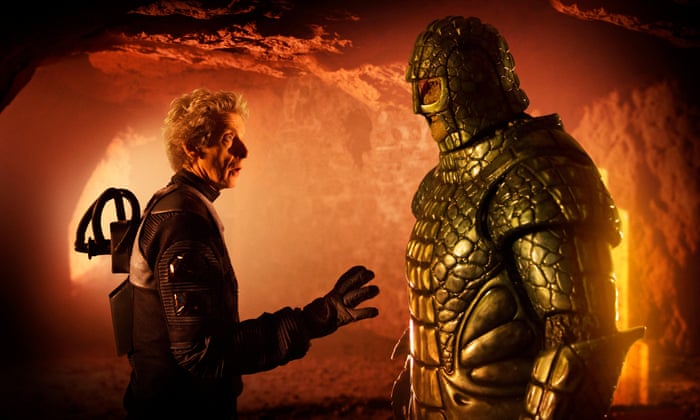
‘The Ice Warriors, they build a city out of Mars’ sand then drench the skies with its blood. They could slaughter a whole civilisation then weep at the destruction of a flower.’
Who’d have thunk it, this of all weeks – a “bloody difficult woman” with statement hair faces off against a tribe of men in red with guns they don’t like having to use, and after an epic battle, nobody actually wins. Doctor Who, as ever, proves a mirror for our times.
Mark Gatiss returns to Doctor Who’s writing desk for what might be the last time with another appearance from the show’s fifth most iconic monster: Mars’ original guvnors the Ice Warriors. When it emerged that Steven Moffat was leaving the show, Gatiss considered (although no decisions have been made) that it might also be time for him to move on after 11 years. So he asked his chum if he could do what he had always wanted – Ice Warriors on Mars. Happily, the man from Paisley said yes.
Infiltrating Nasa for little more than jokes, the Doctor, Bill and Nardole excitedly follow an exploratory mission to the red planet which – because this is Doctor Who – is also the hideout of a squad of British army soldiers from 1881. When the Doctor’s eyes widen at their emergence, marveling simply “Ice Warriors!”, you just know it’s the writer talking. It’s always fun to see the Doctor excited.
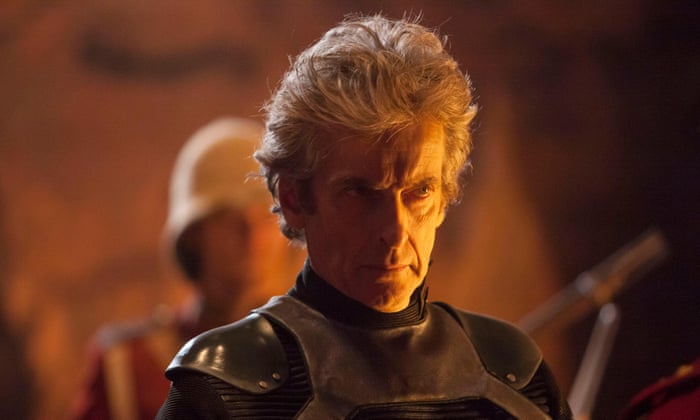
With the soldiers now stranded, they’re sitting not-so-pretty, with lone Martian “Friday” posing as a butler for them while the Colonel tries to repair their rocket (in Victorian times, but let’s just suck that up). The arrival of Team Tardis enables the discovery of an ancient catacomb. With the soldiers salivating at the easy loot, it barely even calls for the Doctor to hopelessly implore how badly this is going to go. Cue Friday’s true intentions revealed and the Martian Queen Iraxxa awoken – a design classic, all dreadlocks and shiny deep green. She and the hive have overslept for 5,000 years and are ready to spend the next few hours flip-flopping about whether or not to kill people.
What plays out is something more nuanced than the regular “isn’t war stupid” stories. Both sides’ need for survival, rather than thirst for conquest, are drawn broadly around their military pissing contest. In the end, things are resolved by necessity, not victory – “we either live together or we die together.”
‘I daresay the British army is more than a match for a bunch of upright crocodiles!’
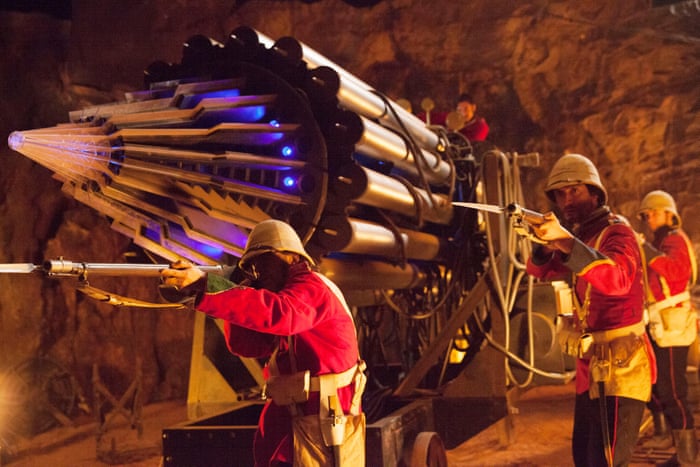
To its further credit, Empress of Mars makes great use of its guest cast. Even in strong episodes like Oxygen, putting proper flesh on their bones often comes second to moving the adventure along – but there are fleshy characters all around here. Sergeant Major Peach, haunted by his previous treason and hiding behind ennobled authority; Colonel Keshup revealing his true selfishness at the final flourish; and Jackdaw, surely doomed by his avarice. All of them are dealing in their own ways with the brutality of army life, and ordering types of tea according to rank. This Boys’ Own stuff is where Gatiss has often excelled, so it’s no bad thing that he plays to his strengths. He recalled in this month’s Doctor Who magazine taking their names from Dorset graveyards: “all the best names come from tombstones!”
Mind you, Bill has less to do here, playing more to the traditional “companion” role after last week’s turn centre stage. And Nardole barely features at all, written in because Matt Lucas was so keen to have him as a regular. Tally-ho!
Fear factor
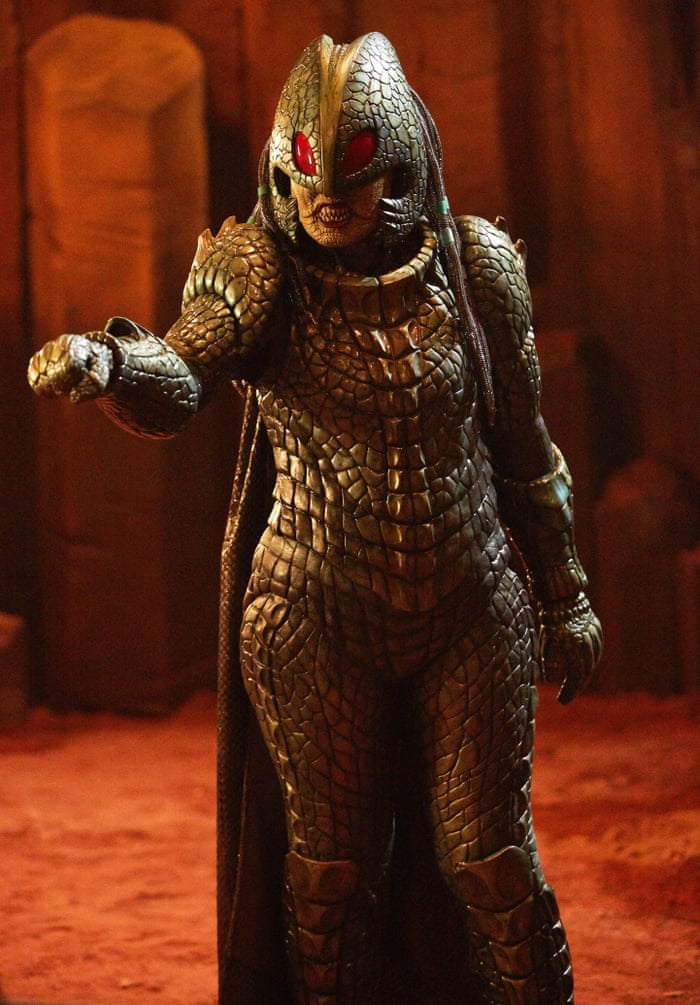
An obvious and not-unwelcome influence here is obviously 1967 classic The Tomb of the Cybermen. Menace and suspense pivot off each other, and the fact that the Ice Warrior hive don’t awaken until quite a way into the episode give it a stronger aroma of Classic Who – those stories that devoted whole first episodes mainly to wandering round, exploring. And when Iraxxa slays, she slays.
Mysteries and questions
With the Monks out of the way, as thankfully for real-life viewers as for residents of the fictional oppressed Earth, it was time for a jolly good standalone. Which means there’s little speculation to be done here. Except for that final twist, with Missy now a fully-fledged member of Team Tardis. Clearly this won’t end well, but do we think she’s genuine in wanting to turn good for now, or is this all part of one long Mistressplan?
Continuity corner
Indigenous to Mars the Ice Warriors may be, but we’ve seen remarkably little of them on their home world before. Their most notable stories found them in political allegories about 1970s Britain on the planet of Peladon. (Most recently we found one sleeping in a 1980s Cold War submarine.) Empress of Mars finds this new hive there for the first time in 50 years. And if all goes well in the off-screen events to follow, we could be, as the Doctor observes, heading for a new Martian golden age.
Deeper into the vortex
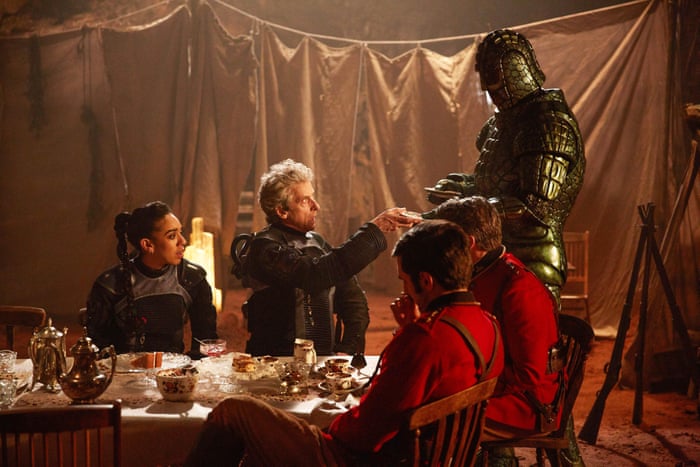
Way to infiltrate Nasa.
After Victory of the Daleks, Gatiss doesn’t half have a thing for having formidable alien warriors serving tea to humans.
Of course Mars is going to be claimed by the British Empire.
The gags about The Terminator and The Mummy were good fun, but we get it now. Bill likes sci-fi and she would be into Doctor Who if she wasn’t in Doctor Who.
Next week!
If you’re a superfan, you’ll already have your ears cocked about The Eaters of Light. It comes from the pen of Rona Munro, the world-renowned playwright who wrote Survival, the very last story from the classic series.


★★★★★ I do hope, dear reader, that you weren’t spoilerised before seeing this episode. I wasn’t and as a result – I’m not ashamed to say – I gave a little fanboy squeee of delight when, at around the 40 minute mark, Mark Gatiss ticked off a big box on my wish list and, for a fleeting moment, brought Alpha Centauri back into the Doctor Who fold. After 43 years!
Once seen, never forgotten. Described by Jon Pertwee’s Doctor as a “hermaphrodite hexapod” (there’d be a more PC term today, no doubt), this peculiar alien, a delegate from Alpha Centauri, debuted in the 1972 classic The Curse of Peladon and was last seen in the less-than-classic The Monster of Peladon (1974). In the 70s, without its cloak it looked like a huge tentacled phallus and caused hilarity in rehearsals. In 2017, we only get a glimpse of its bulbous head and single eye.

Once heard, never forgotten. Of indeterminate gender, he/she/it had a high-pitched voice provided off camera by seasoned actress Ysanne Churchman (famed as the ill-fated Grace Archer from the BBC radio soap). How wonderful that Churchman is still going strong in her 90s and agreed to record a brief voiceover cameo for Alpha Centauri in Empress of Mars.
There I go, blithering on about something that lasts less than 30 seconds on screen. It will mean nothing to the passing punter but for someone who’s been watching Doctor Who as long as I have, it is a small pleasure. Moreover, with the appearance of a representative from Alpha Centauri (who knows, it could be the same individual), Gatiss shores up the mythology of the Ice Warriors. He depicts the turning point in their history when they looked outwards and would one day embrace the Galactic Federation, which loomed over those 1970s Peladon stories. “This might be the beginning of the Martian golden age,” says the Doctor.
The Ice Warriors themselves debuted in Doctor Who 50 years ago (November 1967) and swiftly became one of the most popular adversaries. After a long absence, Gatiss first brought them back – just the one, actually – in the 2013 Matt Smith episode Cold War. Strangely, across all those years we’ve seen them on Earth, the Moon and Peladon, yet until now never on their home planet Mars.
They were originated by Brian Hayles (who died in 1978) and it’s fair that now Mark Gatiss has taken a degree of ownership. He establishes that they congregate in a hive; they hibernate for millennia underground (rather too close to the Cybermen, Silurians and Sea Devils for my liking); they have a gross new body-boulderising death ray; and they are in thrall to an Ice Queen, an empress with the reptilian equivalent of dreadlocks and shocking teeth. The masks, costumes and make-up are all extraordinarily good – faithful to the past while improving on it.
While macho posturing and blather about the “code of the warrior” can be wearing and done to death in drama, the set-up here contrasts the mettle of the Martians with that of the Victorian soldiers. In microcosm, it examines the standards and capabilities of two empires. (Sweetly, Queen Victoria is glimpsed as Pauline Collins’s version from the 2006 David Tennant episode, Tooth and Claw.)
Gatiss provides a cast of guest characters with more than a smidgeon of depth – hard to pull off in the 45min format and lacking this year. The Ice Warriors aren’t just stock monsters. They are, as they’ve always been, since Bernard Bresslaw played Varga in 1967, relatively complex beings; warriors that act with honour, strength and loyalty but open to reason and negotiation. “Friday”, the soldiers’ factotum, has dignity and wavering allegiance. Queen Iraxxa is formidable and knows when to kill and when to listen.
The red-coated soldiers look fresh out of the classic 1963 movie Zulu – Empress of Mars is set in 1881, only two years after the Battle of Rorke’s Drift, which that film depicts. Gatiss gives his men fruity names. Godsacre, the cowardly colonel who deserted his post and survived a hanging, is sensitively played by Anthony Calf. He made his TV debut in Doctor Who way back in 1982 (The Visitation) and I remember him vividly from the original 1994 staging of My Night with Reg.
The fabulously monickered Ferdinand Kingsley (son of Sir Ben, dontcha know) is excellent as Captain Neville Catchlove. Dashing-bordering-on-dastardly, he resists twirling his tache but does give his luscious locks a tidying flick. “We’re British. Mars is part of the Empire now,” he preens.
“In this scenario the humans are the invaders,” explains the Doctor. “On the other hand, the Ice Warriors have vastly superior armaments, which will wipe the humans out.” It’s the Doctor’s Dilemma of the Week, and crucially it’s left to Bill to mediate with Iraxxa. The Ice Queen tells her: “We are both surrounded by noisy males. I would value your opinion.” Really? Well, I suppose it could happen. Although the Doctor has a hand in brokering peace, it’s pure Mark Gatiss that it’s principally two women, a “coward” and ultimately an indeterminate cyclops who achieve a happy ending.
Empress of Mars was commissioned before Nardole had been made a mainstay. He slots nicely into the bookends of this episode but is otherwise omitted. Unless I missed it, no explanation is given as to why the Tardis flies him back to Earth (seemingly of its own accord) abandoning the Doctor and Bill. In a roundabout way it brings Missy into the mix.
I love the eerie choral theme Murray Gold gives Missy (excellent soundtrack this week), who looks quite at home inside the Tardis. But whatever is she hinting at when she examines her old friend? “But Doctor, please tell me. Are you all right?” That gives quite a chill. She sees something no one else can. It gives credence to the suggestion that maybe he’s holding a regeneration at bay, a condition that may go back to the ravages of Oxygen or earlier, that like the William Hartnell Doctor at the end of days “this old body of mine is wearing a bit thin”.
Empress of Mars has so much going for it really. It’s tightly written and directed, well cast, gorgeously designed, looks to the future while nodding at the past. Everything I like in a Doctor Who.
For pure entertainment, Empress of Mars is wavering between the four- and five-star mark on my radar but, because it has so many details that tickle me and because this could well be Mark Gatiss’s last stab at Who, I’ll be generous and award it the V for Victory.
PS. Next week’s is bloody good too. We’re on a roll now towards the finale.


There’s a pair of fascinating ideas at the core of “Empress Of Mars.” The first is more philosophical: As the Doctor puts it, whose side is he on when the humans are the invading aliens? (And, while it’s never so much as hinted at, the obvious corollary to that is whether his loyalties and perspective would differ from those of a human like Bill.) This is such an obvious moral dilemma to build a Doctor Who story around that it’s a little shocking it’s taken so long for the new series to go there. And even if the series didn’t want to tease a heady concept such as that, there’s still the other aspect of tonight’s episode, which is the deliriously anachronistic sight of Victorian soldiers tromping about Mars. This isn’t quite Doctor Who embracing steampunk—as ways of playing out this scenario go, having the soldiers happen upon an Ice Warrior spaceship that Friday then uses to get them back to Mars is relatively, well, realisticisn’t the right word, but it involves the least divergence from history as we know it to get Brits on Mars. The episode plays like Doctor Who by way of Edgar Rice Burroughs’ Barsoom stories, with a title that evokes The Princess Of Mars.
Those are both tremendous building blocks for a story, so it’s frustrating that the episode ends up doing little with them. “Empress Of Mars” is the epitome of an undercooked outing. Mark Gatiss’ script does almost nothing with the supposed moral dilemma beyond define what it is. Otherwise, there’s little sense that his decision-making is challenged or altered in any substantial way by the role reversal. He’s the Doctor, he tries to keep everyone alive, he attempts diplomacy where the humans and the Ice Warriors would just start fighting. This is business as usual. There’s none of the politics or the nuanced morality that was on display in last season’s “The Zygon Invasion”/“The Zygon Inversion” or even in a less accomplished effort like the Silurian two-parter “The Hungry Earth”/“Cold Blood.” Tonight’s episode could have just been a fun romp with Ice Warriors and Victorians, but it explicitly set up a deeper conflict that it then shows no particular interest in.
Some of the problem could be that one theoretical strength of the episode cancels the other out. The stated dilemma of the Doctor being forced to side with the aliens against the invading humans isn’t really compelling if the latter present no threat, and a bunch of 19th century soldiers aren’t about to pose much danger to a bunch of cybernetic reptiles. Even here there’s an opportunity for “Empress Of Mars” to dig deeper, as Catchlove makes a couple references to his unshakeable belief that the military might of the British empire can take care of any challenge. This season of Doctor Who already demonstrated a willingness to interrogate the crimes of imperialism in “Thin Ice,” but—at least in the context of writing for this show—Mark Gatiss doesn’t display the kind of intellectual curiosity that Sarah Dollard does. The hubris of a would-be conqueror could have given “Empress Of Mars” something meaty to focus on, but again this all just happens in passing, underdeveloped mentions.
Gatiss has written more episodes of new Doctor Who than anyone who hasn’t served as showrunner, with “The Unquiet Dead,” “The Idiot’s Lantern,” “Victory Of The Daleks,” “Night Terrors,” “Cold War,” “The Crimson Horror,” “Robot Of Sherwood,” “Sleep No More,” and now this to his name. I’d say his record is a bit better than his reputation would suggest, with “Night Terrors” and “Sleep No More” the only truly bad outings in that corpus, and the remaining seven stories suggest a trend: Gatiss is fond of setting his stories in the past, but only rare does he explore, let alone interrogate what that past really means. Some of those other episodes worked because they threw aside realism or depth in favor of a more comedic touch, playing more upon the larger-than-life stereotypes of an era than the reality. Since “Empress Of Mars” gives us Victorian soldiers in their most distinctively imperial uniform, the potential is there to bust out everyone’s most plummy accents, have the “topping” and the “wot” flow freely, and just generally make the whole thing a caricature of Britain’s glorious past being completely outgunned by the Ice Warriors.
Instead, the soldiers’ stories largely focus on the two officers, the villainous Catchlove, played by Ben Kingsley’s son Ferdinand, and Anthony Calf’s broken, rather feckless Godsacre. Neither turns in a bad performance, but when this season has consistently elevated itself on the strength of its supporting turns, neither makes much of an impression. Neither pitches their portrayals big enough to work as archetypes of the Victorian mindset, nor do they offer the kind of lived-in performances that might unlock the story’s hidden depths. Compare this with Mark Gatiss’ one absolutely classic outing, “Cold War,” which has at its heart three brilliant, nuanced guest turns from Game Of Thrones’ Liam Cunningham, Outlander’s Tobias Menzies, and seemingly everything’s David Warner. The settings also make a difference: A claustrophobic Russian submarine just looks a hell of a lot better than the Martian caves, which make the episode look set-bound in a way new Doctor Who rarely does. I don’t even know whether “Cold War” necessarily reads on the page as being wildly better than “Empress Of Mars,” but that’s why the BBC doesn’t just post a copy of the script in the latest Radio Times and call it a day. (Which, in fairness, would only probably have been a slight budget savings over the cost of taping during certain points of the classic series.)
I’m being hard on “Empress Of Mars,” as it’s the kind of story where it’s far easier to identify its rather concrete flaws than tease out its more elusive strengths. Much as I’m underwhelmed by how little Gatiss’ script does with Victorians on Mars, that’s still so bonkers a premise that the episode can’t help but derive some energy from that. Peter Capaldi and Pearl Mackie are as reliably great as ever, though they stay on the sidelines here far more than most of this season’s episodes. Capaldi excels at playing the Doctor as diplomat, with his invocations of Ice Warrior culture and history ringing with impressive authenticity. Bill’s renewed love of pop culture plays like something other episodes were meant to seize on after her professed sci-fi fandom in “The Pilot” but only Gatiss remembered to. It’s a bit out of place with the rest of the season, but her string of references make for some good gags, and it fits well with Mackie’s fun performance. Bill’s willingness to act as decoy and her ability to parlay with the empress as a fellow woman both suggest a companion coming into her own, a logical progression from her development over the course of the season. Doctor Who should be more than just a hangout show with the Doctor and his companion, but when the main pair are this good, it’s hard for any episode with them in it to be genuinely bad.
Besides, if there’s one thing this episode does show a real love for, it’s the Ice Warriors. As Gatiss pointed out in a recent interview, he has now written a third of their TV stories, and he’s had the chance to fill in some blanks surrounding their culture. The single best moment of tonight’s episode comes when the Doctor summarizes the complex duality of this martial culture, crediting them with great beauty and destructive wrath. (Bill suggests they are like the Vikings, when a more provocative, thematically rich episode would have gone with the comparison staring everyone in the face and connected them with the great “civilizing” force known as the British empire, but oh well.) The conflicted loyalties of the Ice Warrior known as Friday represent the episode at its most complex, and the episode actually pulls out a decently good climax as Godsacre sacrifices himself to save his men. These moments are too isolated to gel into something deeper, but they are indicative of the deeper levels Gatiss can reach when he engages with the Ice Warriors, the same kinds he attained in “Cold War.”
Plus, in a move that I have no doubt left even some hardcore fans a bit confused, Doctor Who went and got 92-year-old Ysanne Churchman to voice the androgynous alien Alpha Centauri, thus directly linking “Empress Of Mars” with the Ice Warriors’ two appearances in the Peladon stories of the Jon Pertwee era. If that’s how Gatiss is bowing out as a Doctor Who writer—he’s said he’s not sure if Chris Chibnall will ask him to write for the show, though I suspect Gatiss will be back—it’s hard to imagine something that could simultaneously be so delightful and so perfectly illustrative of his repeated struggle to move beyond what Doctor Who has been and create something new and unique.
Stray observations
I’m not sure we ever get a proper explanation for why the TARDIS runs off like that, though I suppose it’s possible it could tie into whatever Master(s) plan awaits us in the finale. As for Missy’s appearance here, it sure feels like Michelle Gomez had only a few hours to spare to shoot her scenes, as otherwise I’m more than a little cross we didn’t get to see Missy and Nardole as the demented TARDIS team we all deserve.
The opening at NASA is fun, even if I’m not entirely sure why the episode needed it. The mystery of “God save the Queen” written out in the rocks is fine for what it is, and I suppose the show has to at least pay lip service to the idea the Doctor and Bill aren’t just traveling in the TARDIS whenever the mood strikes them, so they need some reason to head to Mars in the 19th century. It’s just another little disappointment that the show doesn’t use that mystery as anything more than a perfunctory bookend for the story instead of building something more interesting with it.
I’ll say this though about Gatiss: I seriously underrated “Robot Of Sherwood” when I first saw it. That episode is damn good, with some real depth to its exploration of what it means to become a legend. It probably says a lot about the averageness of tonight’s episode that I’m wrapping up by praising a completely different episode, but there it is.

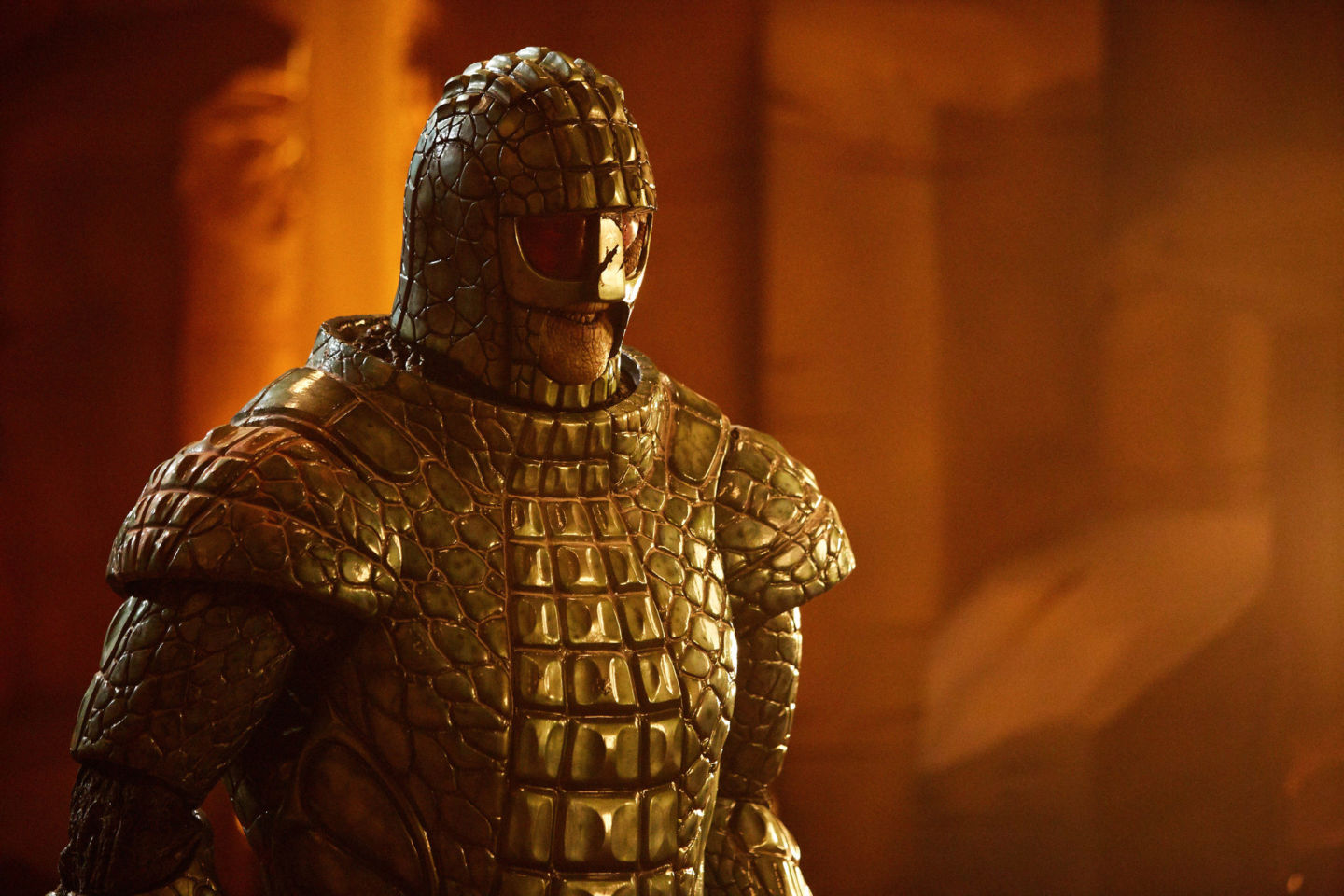
This is a post-UK broadcast review of Doctor Who: Empress of Mars. River Song always warned the Doctor against spoilers, so be sure to watch the episode first. Doctor Who, season 10, airs on Saturdays at 7:15pm UK time on BBC One, and 9pm EDT on BBC America.
Is Nardole’s bumpy ride on the TARDIS a metaphor for season 10 of Doctor Who? After a strong start, this series is really starting to flag now. Even the performances from the three stars are at best middling in Empress of Mars—though the return of the Ice Warriors and some pleasing nods to classic episodes are welcome.
We’re back to a loud (monsters) and quiet (negotiation) episode after the disappointing Monks trilogy with a contained story—penned by Doctor Who superfan, Mark Gatiss—that’s a little too heavy-handed with the flour, giving us a dense slice of British Empire-building… on Mars. We’re on invasive, aggressive, downright rude territory here.
Most of that is portrayed through the words and actions of one man: Catchlove (Ferdinand Kingsley). It’s an amusing name, given that all he seems capable of catching from the reptilian Ice Warriors is a cold.
The backstory just about works: Victorian-era soldiers from the British Army, posted in South Africa in 1881, stumble across an interplanetary vessel and, once on-board, they discover a half-dead Ice Warrior who has been asleep for 5,000 years. His cryogenic cell is on the blink, so the soldiers agree to help the Martian, who they name Friday in reference to Daniel Defoe’s novel Robinson Crusoe.
As the Doctor (Peter Capaldi) describes it, the soldiers have agreed to return Friday to his home with the plan “to claim Mars in the name of Queen Victoria. To loot it of its riches, stake a claim. The Red Planet turned pink.”
The trade deal—yet another topical theme in this series of Doctor Who (is Gatiss alluring to Brexit, by any chance?)—will allow the men to dig for treasure on Mars. But at the same time, they’ll unearth the real prize in this episode: Empress Iraxxa (Adele Lynch).
Gatiss isn’t afraid to rely heavily on sci-fi tropes in Empress of Mars, directed by Wayne Yip who also shot last week’s flop, The Lie of the Land. Friday’s spaceship crash-landed on the Red Planet and supplies are running low. Yet one doesn’t sense much jeopardy from their plight.
There’s also an apology, of sorts, for the number of blokes cast in this episode. Lines are clumsily inserted into the story to account for the lack of women. Iraxxa and Bill (Pearl Mackie) have some kind of sisterhood vibe going on, but it’s too stilted. I can see that Gatiss is trying to portray the females as straight-talking, kick-ass characters who reject the actions of the tea-drinking, sly men of red coats and pith helmets. But there’s not enough interchange between Bill and Iraxxa for the audience to invest in. If only this episode went with a Queen-off: Victoria versus Iraxxa in Mars. That I would like to see, especially since the British monarch has appeared on Doctor Who before now.
I do think this is one of Gatiss’ more successful scripts, mostly because his love for the Ice Warriors shines through. The nerdy attention to detail on these Martians’ motivations makes the Monks look even more misplaced in the Doctor Who cannon. It’s also a lovely touch to have a cameo appearance from Galactic Federation ambassador, Alpha Centauri, voiced by original actor Ysanne Churchman. But the series story arc is starting to drag. We’re still awaiting the big reveal and I’m getting a bit impatient for something to happen.
Missy in action
The Doctor’s increasing reliance on Missy—whether he has control of calling on her help (as he did in The Lie of the Land), or not (in Empress of Mars, Nardole, played by Matt Lucas, seeks instructions from Missy after the TARDIS starts playing up)—clearly comes with a “don’t drive machinery while taking this medication” warning sign. But what does it mean? Again, the long-promised return of John Simm as the Master is yet to materialize in season 10, and now only three episodes are left to go.
Will Missy (Michelle Gomez) regenerate back into the Simm incarnation, or will the Master and Missy appear in the same time stream, wreaking havoc as they go? I also still have this lingering feeling that, somehow, everyone is still locked inside the simulation machine. It would certainly account for the Doctor’s erratic behaviour of late. But then, he’s also getting twitchy about his own impending regeneration. I have a hunch about that, too: it won’t happen until the Christmas special.


As Series 10 hits its ninth episode The Doctor and his TARDIS team are off to Mars, and Mars in the past no less.
After a quirky introduction at a space mission control, an impossible message on the surface of the Red Planet piques The Doctor’s interest.
Off to solve a good old fashioned mystery, The Doctor and Bill find Victorian soldiers where they shouldn’t be, an Ice Warrior serving tea and the TARDIS doing a runner with Nardole inside.
With some hat doffing to the classic era of Doctor Who and some updated spacesuits, this week it’s The Empress Of Mars.
I really only write these intros so I can hide spoilers below, so if you haven’t caught up with episode 9 go no further.
And… how is it episode 9 already?! The departure of Capaldi is coming up way too fast (sobs)!
The plot of Empress Of Mars is a nice, straightforward tale – which is welcome after the previous chapters of The Monk Trilogy .
A quirky message leads the TARDIS team to Mars of the past where they discover a small battalion of Victorian army soldiers quite at home. But the humans predictably awaken an alien threat, headed by the Empress of the Ice Warriors. With inter-species diplomacy quickly failing, she wakes her sleeping subjects and it’s up to The Doctor to save the day.
With more than a small nod to classic Who, a more apt title for the story could have been The Tomb Of The Ice Warriors as it shares quite a lot of DNA with the Second Doctor Cybermen story.
At the heart of the story is The Doctor trying to pull off a balancing act between reckless humans and an alien race. Yes, it’s been done before with stories like Silurian two parter Hungry Earth/Cold Blood but here The Doctor is placed more on the side of the resident Martians. It is, after all, their planet the humans are bumbling around on. It’s almost as if Doctor Who met the film Zulu on Mars.
Gatiss brought back Mars natives, The Ice Warriors in Series 7’s episode Cold War – having previously totted up several appearances in the classic era of Doctor Who.
While a decent threat that plays out well, it does slightly undermine the previous build up of Cold War. The Ice Warrior Skaldak was presented as a nimble, cunning and dangerous adversary.
Empress Of Mars takes a small step backwards with how the Ice Warriors operate – more a lumbering army of extras getting the standard Doctor Who choreography. Whether this is by design, to build up The Empress herself isn’t clear. It works, but doesn’t really do much to move what we know about the Ice Warriors forward.
And at some point, we’re going to have to get the timeline of Mars in check because multiple visits to the planet, and the history of The Ice Warriors, are becoming complicated.
The duo of Capaldi and Mackie continue to be a pleasure to watch even if there’s not really much for them to do in this outing. The Doctor does what The Doctor does, with small morality asides and Bill ably plays her part with some great interactions with the Empress herself.
There’s a healthy dose of mocking the British Empire of the past. The colonial arrogance of assuming that the Red Planet is now part of the British realm just by stepping foot on the surface, reducing an alien to play the role of Man Friday and profiteering through theft.
Guest characters in Doctor Who can sometimes be wonderful, empathetic people that the audience get invested in when they are placed in danger.
Not here. Gatiss serves up a small army of disposable red shirts, flawed and unsympathetic to be picked off until only the worthy remain. It’s a reversal that works well in Doctor Who, seen before in episodes like Voyage Of The Damned but this motley crew are just a little one dimensional. The cliched stupid humans angle gets overplayed more than once.
The manner by which the army are picked off, a human scrunching ray, is pretty gruesome for kids TV but seems a fate reserved for those that kind of deserve it. And it looks wonderfully horrific on screen.
There’s some lovely touches throughout Empress, from a portrait of Queen Victoria as played by Pauline Collins and a call back to classic adventure The Curse of Peladon via big eyed Alpha Centaurians complete with spot on warbling voice.
The new spacesuits look great, but I confess I’ll miss the running gag of how many bright orange suits the Doctor picked up from the base in The Satan Pit.
The Missy subplot gets a small outing this week, but enough to keep it interesting. Why does the TARDIS suddenly whisk Nardole away from the rest of the team and back to Earth?
The often trouble-making time travel machine normally has a purpose for acting by herself. But this time, it seems the end result leaves Nardole with no choice but to let Missy out of the Vault. It remains to be seen if that was a good idea and if even a brief outing for the Timelady will have consequences.
Overall, Empress is a signature Gatiss episode that keeps it simple, embraces what’s great about Doctor Who (past and present) and doesn’t have a Monk in sight.